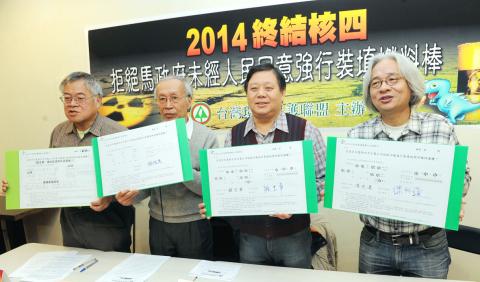The Taiwan Environmental Protection Union (TEPU) and academics yesterday urged the public to sign a petition aimed at stopping Taiwan Power Co (Taipower) from installing fuel rods in the Fourth Nuclear Power Plant in New Taipei City’s Gongliao District (貢寮).
Members of the group, along with Academia Sinica’s Institute of Sociology chairman Michael Hsiao (蕭新煌), National Chengchi University sociology professor Ku Chung-hwa (顧忠華), and award-winning screenwriter and author Neil Peng (馮光遠), said they “refuse to allow the government to install fuel rods [into the new plant] without first obtaining public approval.”
TEPU founding chairperson and anti-nuclear activist Shih Hsin-min (施信民) said the group had initiated the petition for a national referendum, which would ask the public: “Do you agree that Taipower should insert fuel rods into the Fourth Nuclear Power Plant in New Taipei City for test runs?” to counter a referendum proposed by the Chinese Nationalist Party (KMT) last year.

Photo: Wang Min-wei, Taipei Times
The petition has gathered more than 50,000 signatures, but it needs at least 100,000 to pass the first threshold and more than 1 million to pass the second stage for the referendum to be held, he said.
Once fuel rods are inserted into the reactor, the plant bears the risk of a radioactive leak, Shih said.
“Taiwanese should have the right to make the final decision on whether the plant is allowed to operate,” Shih said.
Peng suggested drawing up a list of pro-nuclear groups and public figures — including government officials and legislators — and make sure that these people are “banned from leaving Taiwan” if a nuclear accident ever occurs.
Kao Cheng-yan (高成炎), a National Taiwan University professor and TEPU’s anti-nuclear team convener, said recent problems with the new household registration system had affected many people, but it would be a greater disaster if fuel rods were installed in the new nuclear plant, as it might lead to a nuclear meltdown.
There is “no chance of turning back” once the fuel rods are inserted, they said.
Furthermore, decommissioning the nuclear plant will also entail a huge sum of money to properly handle the radioactive plant, they said.

DEFENSE: The National Security Bureau promised to expand communication and intelligence cooperation with global partners and enhance its strategic analytical skills China has not only increased military exercises and “gray zone” tactics against Taiwan this year, but also continues to recruit military personnel for espionage, the National Security Bureau (NSB) said yesterday in a report to the Legislative Yuan. The bureau submitted the report ahead of NSB Director-General Tsai Ming-yen’s (蔡明彥) appearance before the Foreign and National Defense Committee today. Last year, the Chinese People’s Liberation Army (PLA) conducted “Joint Sword-2024A and B” military exercises targeting Taiwan and carried out 40 combat readiness patrols, the bureau said. In addition, Chinese military aircraft entered Taiwan’s airspace 3,070 times last year, up about

A magnitude 4.3 earthquake struck eastern Taiwan's Hualien County at 8:31am today, according to the Central Weather Administration (CWA). The epicenter of the temblor was located in Hualien County, about 70.3 kilometers south southwest of Hualien County Hall, at a depth of 23.2km, according to the administration. There were no immediate reports of damage resulting from the quake. The earthquake's intensity, which gauges the actual effect of a temblor, was highest in Taitung County, where it measured 3 on Taiwan's 7-tier intensity scale. The quake also measured an intensity of 2 in Hualien and Nantou counties, the CWA said.

The Overseas Community Affairs Council (OCAC) yesterday announced a fundraising campaign to support survivors of the magnitude 7.7 earthquake that struck Myanmar on March 28, with two prayer events scheduled in Taipei and Taichung later this week. “While initial rescue operations have concluded [in Myanmar], many survivors are now facing increasingly difficult living conditions,” OCAC Minister Hsu Chia-ching (徐佳青) told a news conference in Taipei. The fundraising campaign, which runs through May 31, is focused on supporting the reconstruction of damaged overseas compatriot schools, assisting students from Myanmar in Taiwan, and providing essential items, such as drinking water, food and medical supplies,

New Party Deputy Secretary-General You Chih-pin (游智彬) this morning went to the National Immigration Agency (NIA) to “turn himself in” after being notified that he had failed to provide proof of having renounced his Chinese household registration. He was one of more than 10,000 naturalized Taiwanese citizens from China who were informed by the NIA that their Taiwanese citizenship might be revoked if they fail to provide the proof in three months, people familiar with the matter said. You said he has proof that he had renounced his Chinese household registration and demanded the NIA provide proof that he still had Chinese